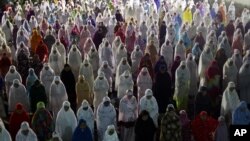What Is Ramadan?
What: Millions of Muslims began observing Ramadan, the ninth and most sacred month of the Islamic calendar, on Monday.
What happens: It is a monthlong period when Muslims, from sunrise to sunset, abstain from eating, drinking and other physical needs, such as smoking or sex. At least two meals a day are eaten: suhoor, before dawn, and iftar, at dusk.
Why: The fast is intended to purify the soul, bring the faithful closer to God, remind them of the suffering of those less fortunate, and create sacrifice and self-discipline.
Exceptions: Children under the age of 12, the elderly, the sick, women who are pregnant, nursing or menstruating, and people who are traveling are exempted.
How is the date determined: Muslims use a lunar calendar and moon-sighting methodology to determine the date, which means different countries may declare the start of Ramadan a day or two apart.
Monday observance: Indonesia, the world's most populous Muslim country, as well as Saudi Arabia, Singapore, Yemen, Lebanon, Syria, Qatar, Kuwait, Jordan, Egypt, the United Arab Emirates, Afghanistan, Central Asia, the Palestinian territories, the United States, among others.
Tuesday observance: Pakistan, Iran and most of India.
End of Ramadan: This year, the holiday month ends on July 5, and is celebrated with a three-day holiday called Eid al-Fitr.





